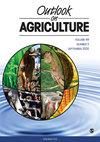恢复加拿大草原地区农业生态系统的社会和生态关系
IF 2.6
3区 经济学
Q1 AGRICULTURE, MULTIDISCIPLINARY
引用次数: 1
摘要
生态系统恢复被提议作为实现全球可持续性目标所需的变革的一个方面。在加拿大的草原地区,自然生态系统向农田的广泛和相对较新的转变使土著人民流离失所,并为蓬勃发展的农业部门让路,我认为生态系统的恢复需要两个相互交织的过渡过程:重新调整世界观,以适应当地生态系统的社会和生物物理背景,采取切实可行的步骤恢复生态系统的功能和完整性。关注生态系统功能——支撑预期结果的关系过程——可以促进农业景观的设计和实施,模仿自然生态系统的关键特征,同时保持土地利用的混合。需要人类的独创性和对传统知识和科学知识的深思熟虑的整合,以开发适合当地的土地利用,支持农田和其他景观特征内部和之间的协同关系。将社会目标融入农业景观设计可以产生创造性的解决方案,但需要转向更开放和合作的方法,特别是在使用私人土地方面。本文章由计算机程序翻译,如有差异,请以英文原文为准。
Restoring social and ecological relationships in the agroecosystems of Canada's prairie region
Ecosystem restoration is proposed as one aspect of the transformative changes required to meet global sustainability goals. In the prairie region of Canada, where the widespread and relatively recent conversion of natural ecosystems to farmland displaced Indigenous peoples and made way for a thriving agricultural sector, I propose that ecosystem restoration requires two intertwined transition processes: reorienting worldviews to embrace the social and biophysical contexts of local ecosystems, and taking practical steps to restore ecosystem functioning and integrity. Attention to ecosystem functioning—the relational processes that undergird the desired outcomes—can promote the design and implementation of agricultural landscapes that mimic key features of natural ecosystems while maintaining a mix of land uses. Human ingenuity and thoughtful integration of traditional and scientific knowledge are needed to develop locally adapted land use that supports synergetic relationships within and among farm fields and other landscape features. Integrating social goals into the design of agricultural landscapes can spawn creative solutions but will require a shift toward a more open and collaborative approach, especially regarding the use of privately owned lands.
求助全文
通过发布文献求助,成功后即可免费获取论文全文。
去求助
来源期刊

Outlook on Agriculture
农林科学-农业综合
CiteScore
5.60
自引率
13.30%
发文量
38
审稿时长
>36 weeks
期刊介绍:
Outlook on Agriculture is a peer reviewed journal, published quarterly, which welcomes original research papers, research notes, invited reviews and commentary for an international and interdisciplinary readership. Special attention is paid to agricultural policy, international trade in the agricultural sector, strategic developments in food production, the links between agricultural systems and food security, the role of agriculture in social and economic development, agriculture in developing countries and environmental issues, including natural resources for agriculture and climate impacts.
 求助内容:
求助内容: 应助结果提醒方式:
应助结果提醒方式:


